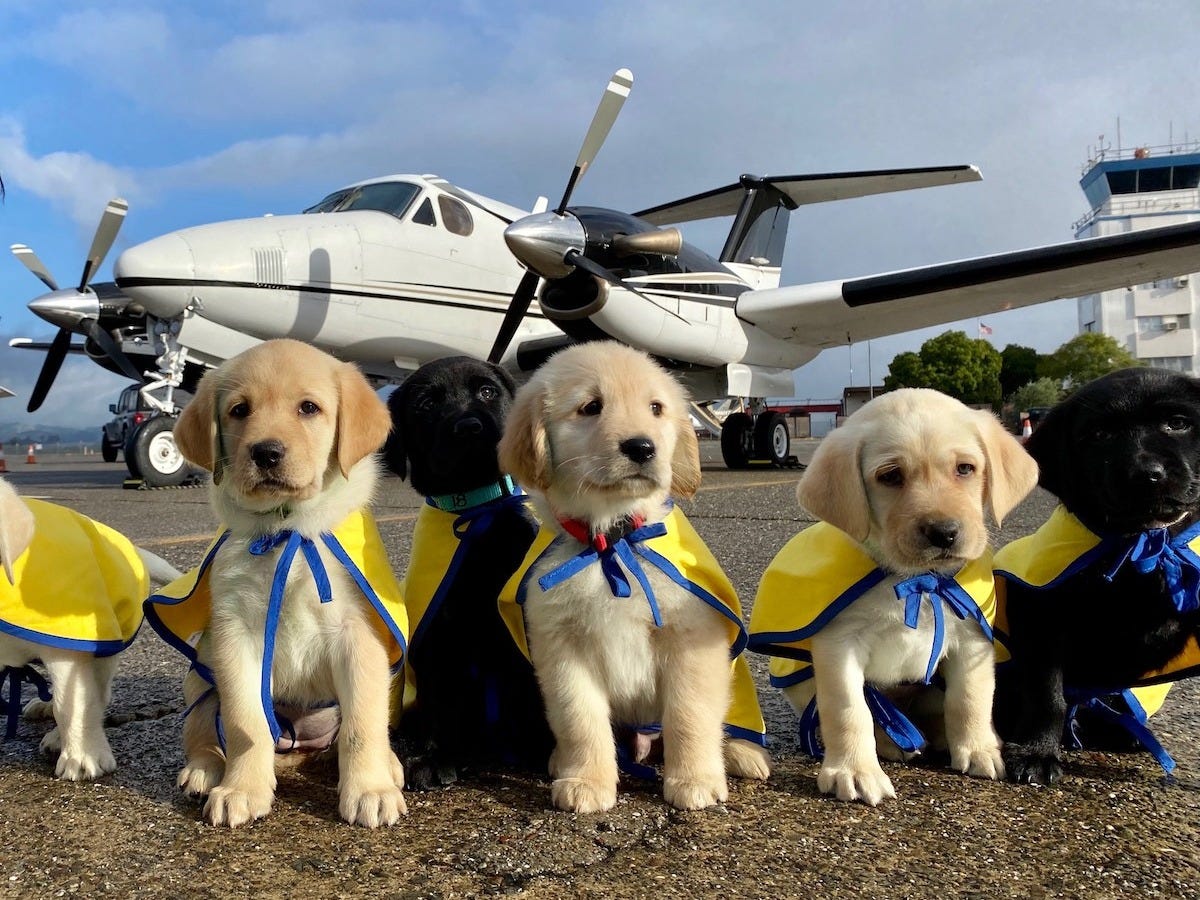- Canine Companions for Independence provides service dogs to people with disabilities free of charge.
- The dogs are bred in California and then transported to homes across the country. The coronavirus led to unreliable flights, so the nonprofit turned to volunteer pilots for support.
- “These pilots have just really stepped up and allowed us to continue our mission,” Michelle Williams, the public relations and marketing coordinator at Canine Companions, told Insider.
- More than 100 dogs are now with temporary raisers who will help train and socialize the dogs before they go to professional training.
- Visit Insider’s homepage for more stories.
Three volunteer pilots left California’s Sonoma Jet Center on March 28 with precious cargo in tow: puppies.
The planes were safely transporting golden retrievers, Labrador retrievers, and mixed puppies to their new, temporary homes. It was each puppies’ first step in becoming an assistance dog.
The pilots were helping Canine Companions for Independence, a nonprofit that provides trained assistance dogs to people with disabilities free of charge.
With the help of the volunteer pilots, the nonprofit has brought 108 puppies to southern California, Idaho, Oregon, Washington, Montana, and Texas.

The nonprofit typically depends on commercial airlines to transport puppies, but the coronavirus caused flights to be unreliable
The nonprofit connected with Martyn Lewis, Josh Hochberg, and Jeff Stewart, three private pilots who fly out of a nearby airport in Sonoma, California.
"Not only are they giving their plane, but their time, their fuel," Michelle Williams, the public relations and marketing coordinator at Canine Companions, told Insider. "They're going out for full days ... it's just incredible."
Hochberg, the owner of Sonoma Jet Center where the planes fly out of, had never flown with puppies before.
"Once they get into the plane, they require less attention than my daughters," he told Insider.
His two daughters will often ride along during the puppy flights. They play with the puppies an hour before takeoff, which wears them out. Once they're on the plane, the puppies usually sleep the entire ride, Hochberg explained.
He said this work has created some positivity for his family in these challenging times.
"It's more fulfilling than I could have possibly imagined," he said. "So fulfilling that I actually got a puppy of my own."
Hochberg's family added a new member, Charlie, an American Brittany, which he fully attributes to his work with Canine Companions.
http://instagr.am/p/CALat52Jcdi
The biggest challenge now is finding volunteer pilots with planes that have the capacity to travel farther east.
"We've got the West Coast covered," Hochberg said. "The challenge is the dogs need to go all the way across the US."
The dogs are bred at Canine Companion's headquarters in Santa Rosa, California. At the nonprofit's breeding center, golden retrievers, Labrador retrievers, and mixes of the two are bred for traits like calm temperament.
The 8-week-old puppies are then placed in temporary homes where families and individuals will raise the dogs. The volunteers will socialize the dogs and teach them about 30 commands. Once the dogs are about a year and a half, they'll be placed in professional training centers, where they'll learn more advanced commands.

Canine Companions emphasized that this is essential work
"Disability doesn't disappear in times of crisis," Williams said.
Canine Companions currently has 400 people on its waiting list for a service dog. "If we were to put everything on hold, those people are going to wait longer for their assistance dogs," she explained.
Luckily, the work hasn't paused, and now the puppies can begin their road to becoming a service dog.
- Read more:
- 14 ways people around the world have spread joy to brighten up your week
- A BBC sports broadcaster held a Zoom meeting with his 2 dogs to deliver their annual performance reviews
- The Oregon Zoo shared an adorable video of a black bear splashing around in a giant bathtub
- Beaches around the world may be empty, but conservationists question if sea turtles are truly thriving during lockdowns
